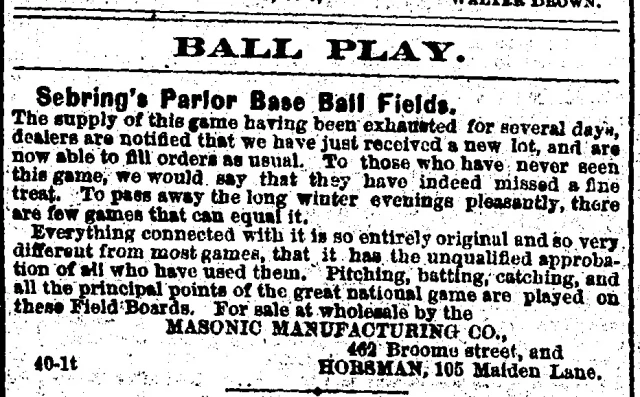Who invented the game? And why didn’t he apply for a patent, a service available since 1790? Baseball was played in America before Abner Doubleday and Alexander Cartwright were born; both went to their graves not knowing they had invented it. That opens us to a larger story, one that spills out on the web pages of Protoball.
And yet, early baseball patents and advertisements are fascinating because they reveal how and when the new sport — as played by adults — began to penetrate the broader culture. If there was a buck to be made from it, then the audience for the game had grown beyond those who played it.
Francis C. Sebring of Hoboken was the noted pitcher of the Empire club. His “Apparatus for Playing Parlor Base Ball” was depicted in Leslie’s in the issue of December 8, 1866 and advertised for sale in that same month, wholesaled by the Masonic Manufacturing Company and retailed at $3.00 by E.I. Horsman. By mid-January 1867 Horsman and other dealers were advised that supply had run out, and more would be ordered.

Sebring’s game sells out, Clipper, January 12, 1867
Leslie’s described Sebring’s game thus: “This game is designed to illustrate the theory of base-ball, [and was] originally designed for the use of an invalid ball-player, but Mr. Sebring … now presents it to the public as the most attractive parlor game in vogue, and one in every way calculated to attract ladies, youths, and amateur ball-players.…”
I was surprised to note that Sebring’s game was not patented until February 4, 1868, and had been preceded to registration by another table game, that of William Buckley, on August 20 of the prior year. (There is no evidence that his game was commercially produced.) No example of either game has survived, alas — though they could be recreated from their detailed diagrams and designs.

The Sebring patent design, February 4, 1868
Searching through the government’s records — this is how old boys have fun — I discovered an even earlier baseball patent: Isaac P. Tice’s “Toy Ball-Player,” registered on July 23, 1867. This was not a game but rather a device — one that would later be used to create mechanical banks, with a pitcher tossing a penny to his catcher, past an ever futile batter.